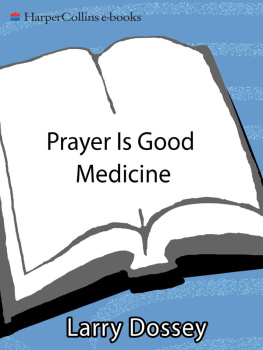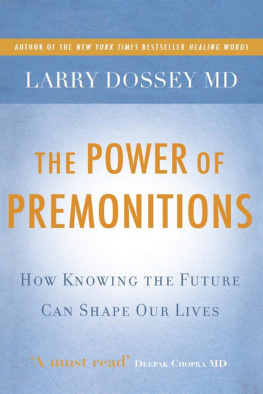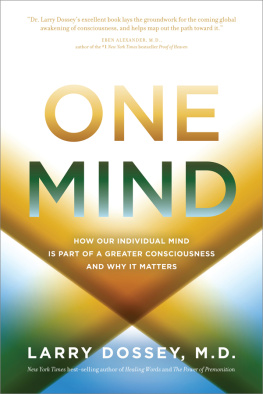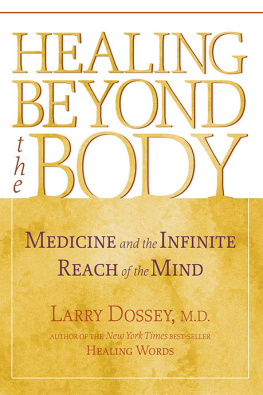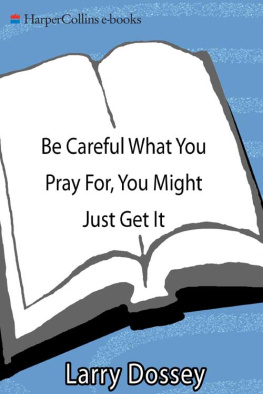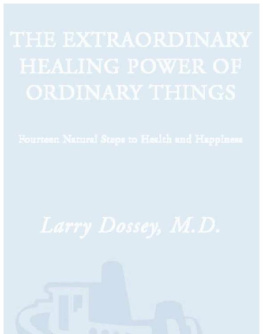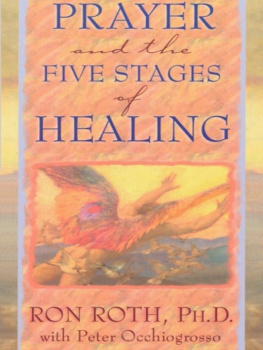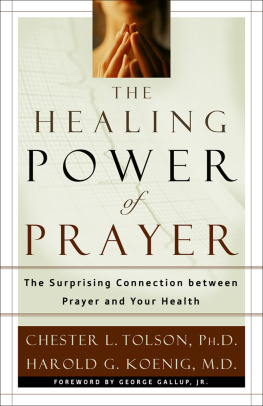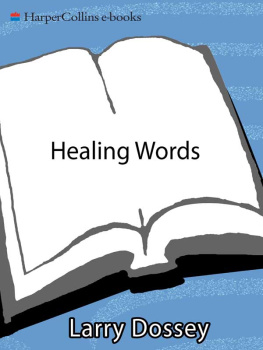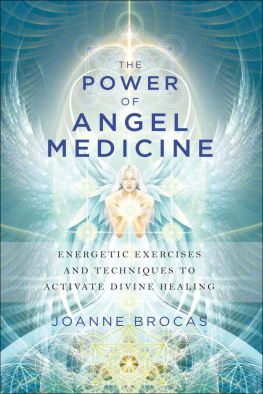Larry Dossey - Prayer Is Good Medicine: How to Reap the Healing Benefits of Prayer
Here you can read online Larry Dossey - Prayer Is Good Medicine: How to Reap the Healing Benefits of Prayer full text of the book (entire story) in english for free. Download pdf and epub, get meaning, cover and reviews about this ebook. year: 2011, publisher: HarperCollins, genre: Religion. Description of the work, (preface) as well as reviews are available. Best literature library LitArk.com created for fans of good reading and offers a wide selection of genres:
Romance novel
Science fiction
Adventure
Detective
Science
History
Home and family
Prose
Art
Politics
Computer
Non-fiction
Religion
Business
Children
Humor
Choose a favorite category and find really read worthwhile books. Enjoy immersion in the world of imagination, feel the emotions of the characters or learn something new for yourself, make an fascinating discovery.
- Book:Prayer Is Good Medicine: How to Reap the Healing Benefits of Prayer
- Author:
- Publisher:HarperCollins
- Genre:
- Year:2011
- Rating:3 / 5
- Favourites:Add to favourites
- Your mark:
- 60
- 1
- 2
- 3
- 4
- 5
Prayer Is Good Medicine: How to Reap the Healing Benefits of Prayer: summary, description and annotation
We offer to read an annotation, description, summary or preface (depends on what the author of the book "Prayer Is Good Medicine: How to Reap the Healing Benefits of Prayer" wrote himself). If you haven't found the necessary information about the book — write in the comments, we will try to find it.
With the elegance of simplicity and the precision of science, Dossey shows us how we can create a lasting partnership between faith and medicine.
DEEPACK CHOPRA, M.D.
Experience the Healing Power of Prayer
From the author of The New Y
Prayer Is Good Medicine: How to Reap the Healing Benefits of Prayer — read online for free the complete book (whole text) full work
Below is the text of the book, divided by pages. System saving the place of the last page read, allows you to conveniently read the book "Prayer Is Good Medicine: How to Reap the Healing Benefits of Prayer" online for free, without having to search again every time where you left off. Put a bookmark, and you can go to the page where you finished reading at any time.
Font size:
Interval:
Bookmark:

To my colleagues in health care
who have had the courage to carry prayer
into the hospital, clinic, and laboratory.
Many terms are used throughout this book to refer to a Supreme Being. In most cases I have chosen as neutral a term as possible, such as the Absolute .
I tend to agree with those wise teachers who say that all the names of God are misleading. As all the major esoteric wisdom traditions tell us, the Absolute cannot be spoken or thought. There are simply no reliable pictures of the Almighty. As the Sufi aphorism soberly states, No man has seen God and lived.
In the fourteenth century, an anonymous English monk believed to be the author of The Cloud of Unknowing , an exalted religious tract that deeply influenced the religious life of the time, added his lament to the futility of addressing and even thinking about the Universal. But now you will ask me, said he, How am I to think of God himself, and what is he? and I cannot answer you except to say I do not know! For with this question you have brought me into thecloud of unknowing. Of God himself can no man think.
As the great thirteenth-century German mystic Meister Eckhart observed, Whoever perceives something in God and attaches thereby some name to him, that is not God. God isineffable. And, It is Gods nature to be without a nature.
At this moment in history, in which were experiencing a much-needed awakening of values that for centuries have been associated with women, perhaps it is important to point out that the problem of naming the Absolute is not resolved merely by replacing all the masculine names and pronouns with feminine ones. God and Goddess, he and she , founder equally. The Absolute is radically beyond any description whatsoever, including gender.
With these limitations in mind, the reader may insert, in every instance that follows, his or her preferred name for the Absolutewhether Goddess, God, Allah, Krishna, Brahman, the Tao, the Universal Mind, the Almighty, Alpha and Omega, the One
If Jesus, Muhammad, and Buddha had had penicillin, they probably would have used italong with prayer.
I believe that prayer and standard medical approaches can be used together. So, although this book deals with why prayer is good medicine, I am not suggesting that it is the only medicine or that it must be relied on instead of other medicines.
Prayer is not better than modern medicine. Prayer, medications, and surgerythey are all a blessing, a grace, a gift. Why not use all of them, with reverence and gratitude?

Prayer is back.
After sitting on the sidelines for most of this century, prayer is moving toward center stage in modern medicine. Doctors are taking prayer not just into their offices, clinics, and hospitals, but into experimental laboratories as well. Medical journals are more willing than ever to publish studies on the healing effects of prayer and faith. Cover stories on prayer have appeared in several national news magazines, and talks shows buzz with accounts of healing and prayer. Even the conservative Wall Street Journal recently devoted a major article in its Marketplace section to the scientific studies of prayer that are currently in progress.
Most of you would probably say, Its about time. Recent surveys show that 75 percent of patients believe their physicians should address spiritual issues as part of medical care, and 50 percent want their doctor to pray not just for them but with them. We doctors appear to be listening. You may be surprised to know that the majority of us actually pray for our patients. In December 1995 a conference entitled Spirituality and Healing in Medicine was held at Harvard Medical School in Boston, one of our best medical institutions. As of this writing, about one-third of the medical schools in the United States have developed courses in alternative/complementary medicine, many of which emphasize spiritual issues in health care, including prayer. Five medical schools have developed programs explicitly dedicated to exploring the relationship between faith and health.
Are we falling into fantasy? Hardly. Statistically, God is good for you, says David B. Larson, M.D., of the National Institute for Healthcare Research in Rockville, Maryland, which studies the relationship between spirituality and health. Larson, a former senior researcher at the National Institute of Mental Health, says, I was told by my [medical school] professors that religion is harmful. Then I looked at the research, and religion is actually highly beneficial. If you go to church or pray regularly, its very beneficial in terms of preventing illness, mental and physical, and you cope with illness much more effectively. If you look at the research, in area after area, its 80 percent beneficial. I was shocked.
So was I. I stumbled blindly into the research on prayer during the 1980s, when someone sent me a scientific paper in which prayer was tested in a modern hospital in a large group of heart patients. It had never occurred to me that anyone would actually test prayer like a new medicationpraying for half the patients and not for the other half, who were the controls, and measuring the results. This study strongly suggested a therapeutic effect of distant, intercessory prayer.
After I recovered from my surprise, I asked myself, If prayer works, shouldnt I be praying for my patients? I was skeptical of prayer at the time, and a single study was not convincing. Needing further proof, I embarked on my own research and discovered, to my further amazement, that there are more than 130 scientific studies in the general area of healing, many of which employ prayer. Over half of these experiments strongly indicate that prayer works. I soon came to regard this evidence as one of the best-kept secrets in modern medicine, and I began actively to pray for my patients.
My explorations of prayer and healing resulted in the 1993 publication of my book Healing Words: The Power of Prayer and the Practice of Medicine . To my great pleasure, the strong reception to the book afforded me the opportunity to discuss prayer with a variety of audiencesmedical schools and hospitals, physician and nurse organizations, lay groups and churches, the National Institutes of Health, a Presidential Task Force on Health Care Reform, a section of the British Parliament, and even the Pentagon.
Certain questions surfaced again and again in these discussions. I know they are on your mind, too, because you sent me hundreds of letters describing your experiences and beliefs about prayer. I discovered that most of you are interested in four general areasthe scientific evidence for prayer, the controversies associated with the prayer experiments, what prayer is, and how to pray. This book is organized around these four categories. The various sections stand on their own and can be read in any order. Be your own guide.
I have written this book as a heart-to-heart talk, not as an academic or scholarly treatise. If you want to look deeper at the scientific issues surrounding prayer, you may consult Healing Words , where you can find descriptions and citations of the experiments themselves.
As you read this book, I hope you will resist the temptation to take an either-or stance toward prayer and modern medicine. As a physician, I have employed medications and surgical procedures because I know they work. But prayer works, too. The way I see it, we do not have to make absolute choices between prayer and high-tech medicine. If you have appendicitis, I believe you should have an appendectomy, because it is the most effective treatment humankind has ever devised for this particular problem. But why not employ prayer in addition to surgery? Prayerlike thoughts, offered from a distance, have been demonstrated to increase the healing rate of surgical wounds, and religious faith is associated with faster recovery from surgery. We ought to follow a common sense approach when were sick: Use what works. In most medical situations there will be a place for both prayer and modern medicine.
Font size:
Interval:
Bookmark:
Similar books «Prayer Is Good Medicine: How to Reap the Healing Benefits of Prayer»
Look at similar books to Prayer Is Good Medicine: How to Reap the Healing Benefits of Prayer. We have selected literature similar in name and meaning in the hope of providing readers with more options to find new, interesting, not yet read works.
Discussion, reviews of the book Prayer Is Good Medicine: How to Reap the Healing Benefits of Prayer and just readers' own opinions. Leave your comments, write what you think about the work, its meaning or the main characters. Specify what exactly you liked and what you didn't like, and why you think so.

